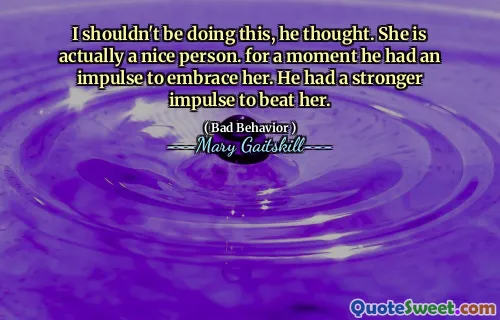
I shouldn't be doing this, he thought. She is actually a nice person. for a moment he had an impulse to embrace her. He had a stronger impulse to beat her.
This quote poignantly encapsulates the complex and often conflicting nature of human emotion and morality. The narrator is consumed with an internal struggle, torn between genuinely recognizing the kindness in another person and battling darker impulses rooted in anger or perhaps frustration. This duality highlights how people can harbor conflicting feelings simultaneously, revealing the blurred boundaries between empathy and aggression. Such internal conflict underscores the fragility of moral judgment, prompting reflection on how easily our perceptions can be overshadowed by underlying impulses that we might not even fully understand. It suggests a deeper narrative of repression, where the desire to act kindly is overshadowed by uncontrolled emotions that threaten to break free. The juxtaposition of the impulses—one to embrace and the other to hurt—serves as a reminder of the volatile nature of human psychology, especially under stress or emotional turmoil. The underlying tension might reflect a story of remorse, misunderstood trauma, or suppressed rage, creating a resonant exploration of moral ambiguity. It invites readers to consider how closely kindness and violence can coexist within a person, perhaps influenced by circumstances, past experiences, or inner demons. Ultimately, the quote prompts reflection on the complexity of human nature, acknowledging that goodness and darkness often intertwine in the same individual, making moral judgments nuanced and multi-layered rather than black-and-white.
Book: ( Bad Behavior ) *Author: ---Mary Gaitskill---







